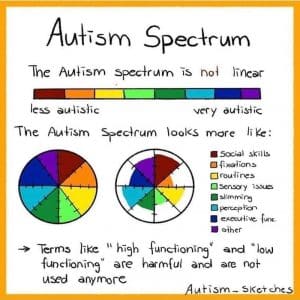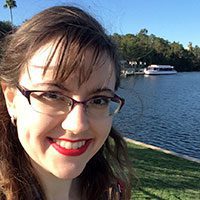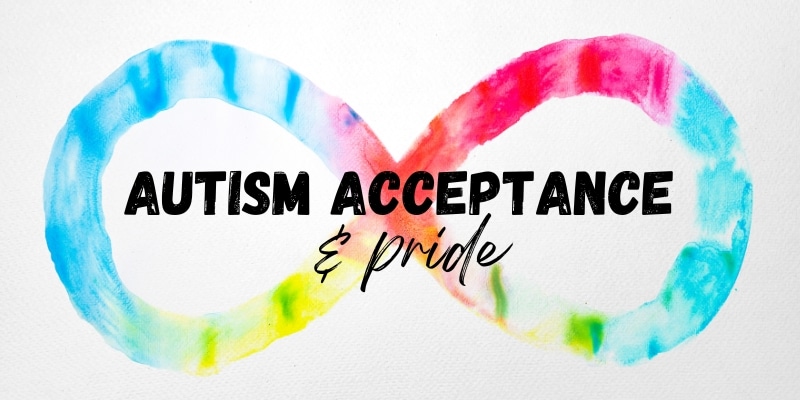By Shelley Harris, Children’s Librarian
Happy Autism Acceptance Month! To understand why we’re celebrating…
Let’s start at the beginning: What is autism & why acceptance?
There are two brain types:
- Neurotypical: what society says is “normal” brain function
- Neurodivergence: differences in brain function
Neurodiversity encompasses both brain types.
- One person is neurodivergent.
- A group of neurodivergent and neurotypical people are neurodiverse.
Autism is a complex neurodivergent, developmental disability that affects how people experience the world around them. It’s easy to misunderstand autism because it’s primarily diagnosed and discussed in terms of what it looks like to neurotypical observers, instead of what it feels like to autistic people.
In the past few years, autistic people have been using a wheel-shaped spectrum to illustrate what autism can look like and why every autistic person has different prominent traits and needs. Not to mention, why it’s wrong that everyone is a little bit autistic: A person may share a trait or two of autism, but not all of them or at a diagnostic level!

Autistic illustrator Rebecca Burgess created a comic in English, Spanish, French, German, Greek, and Indonesian to explain the wheel. This is how autistic artist autism_sketches draws it.
While April is widely known for Autism Awareness, many autistic people prefer to celebrate Autism Acceptance instead, as autistic self-advocate Lyric explains on their blog:
“Unfortunately, historically, in April we have these “awareness campaigns” and they tend to spread fear and have a very negative narrative…I am an autistic person; it’s just a part of who I am. My strengths and my weaknesses are equally tied into being autistic.”
With that in mind, join us in celebrating autistic acceptance and pride all month long!
Watch these videos
I’ve made a few videos about books by and about autistic people.
It’s Too Much! by Jolene Gutiérrez is a great book about feeling overwhelmed and dysregulated, and knowing how to remove yourself from a situation to regulate yourself again. All kids need to know how to advocate for their needs!
A lot of neurodivergent kids and adults need to move their bodies to keep their minds focused. Wiggles, Stomps, and Squeezes Calm My Jitters Down by Lindsay Rowe Parker shows how adults can help kids stay moving and regulated, and support them through dysregulation.
Read these books
It’s especially important to read autistic authors and share stories and materials by autistic creators during April! Here are a few wonderful examples to share with kids:
- Samantha Cotteril’s Little Senses series works as picture books to share with all kids, whether they have autism or not, but also as social narratives for neurodivergent kids facing challenges.
- Tiffany Hammond is an autistic woman with an autistic son and has written an authentic story about love and our judgemental society in A Day With No Words.
- Nicole Fillipone’s Sensory Stories series is about kids who have autistic traits getting the support that they need from the adults and therapists in their lives.
Want a book for grownups? Try Unmasking Autism and I Will Die On This Hill: Autistic Adults, Autism Parents, and the Children Who Deserve a Better World.
Curious if the books you’ve read show good autism or disability representation? I created this evaluation guide (pdf) for kids and adults to use together or on your own.
Attend these events
Autism Pride Storytime
Wednesday, April 24, 3:30 pm, Main Library
This storytime is for kids 3 and older with and without autism, with a caregiver. Register now »
Understanding Autism & ADHD
Monday, April 29, 7 pm, Main Library or virtually on Zoom
When you think about autism or ADHD, do you picture a boy in a school? Are you or your neurodivergent family member looking for support to help explain your needs? Curious about neurodivergence in general? Presented by a neurodivergent librarian (me, Miss Shelley!), in partnership with First United Nursery School and the Collaboration for Early Childhood. Free childcare will be provided in the Storytime Room by the Collaboration for Early Childhood. Register now »
Plus our recurring events:
Supported Storytime
Tuesdays, 1:30 pm, Main Library
For kids 3 and older with disabilities. Register now »
Supported Sensory Playgroup
Every second Wednesday of the month, 4 pm, Main Library
For kids 0-5 who are in or being considered for developmental therapies. In partnership with CITY of Support and local therapists Haviva Siegel, and Brandi Carson. Register now »
Whether you know an autistic person or not, I hope you come celebrate and learn with us!

About Shelley
Shelley is a children’s librarian with a passion for early literacy, serving and celebrating the disability community, and exploring technology. She can often be found practicing storytime songs with her black lab, Bingo.

